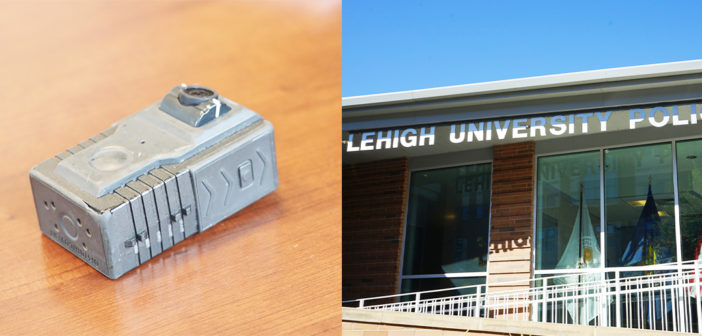The Bethlehem Police Department joined the rest of Lehigh Valley law enforcement, including Lehigh University Police Department, in adding body cameras to the uniform of its officers.
This addition comes two years after the department updated the dash cameras in its police vehicles. With some funding from a federal grant, the body cameras serve the purposes of protection, transparency and monitoring of the behavior of the officers on the job. LUPD and students, both on and off campus, will be affected by this change.
“If they are going to use the cameras, I just hope they will be ethically aware of their choices,” off-campus student Sebastian Galdamez, ’21, said. “(Officers) have a protection. They know the victim can’t do anything stupid because (the camera) will justify their actions.”
Galdamez said he does not see much change with officers having the cameras on their bodies. If anything, he said, he may feel more uneasy. He said he does not want the cameras to be the only reason some officers might change the way they handle situations.
“For the most time, the cameras will be on,” said BPD Deputy Chief Scott Meixell, who has been with the department for 18 years.
Meixell said the officers follow a protocol, and they must turn the cameras on when completing some law enforcement action.
He also said officers are mandated to upload the camera footage after every shift. This footage stays in the system for up to two years.
“The recordings there are able to be played for court and demonstrate what occurred at the time of the incident,” Meixell said. “You have evidence that’s captured in the right way. When things happen, there is that independent representation of what went on.”
LUPD used similar tactics with its policies as well — the department has had its officers wear body cameras for about five years now.
“It is a great tool,” LUPD Chief Jason Schiffer said. “It was a big step to help in police public interaction and transparency. If there is ever anything that’s questionable, there would be a way to verify what actually happened.”
Schiffer, who has been working with the department for two years, said the cameras have helped him monitor the behavior of the officers when interacting with students on campus.
He said by accessing the video footage, he gets a “front row seat” of the situation.
“I can tell exactly what happened, who said what and determine if we did what we should have done, or what we could do better,” Schiffer said.
Schiffer said the footage helps guide the current officers and officers in training.
Like Galdamez, on-campus student Michael Gonzalez-Mercedes, ’22, said he just wants transparency, and he wants to make sure he understands what is going on — with or without police officers wearing body cameras.
“I think (the cameras) have a subconscious effect on the police officer to know that he or she is being watched,” Gonzalez-Mercedes said.
Gonzalez-Mercedes said he hopes both departments use the technology to their advantage and continue protecting students on and off campus.
Both Schiffer and Meixell said the effect of BPD adding cameras to its uniforms is a positive one that will provide even more footage and evidence, and said the departments will continue to work together like they always have.






Comment policy
Comments posted to The Brown and White website are reviewed by a moderator before being approved. Incendiary speech or harassing language, including comments targeted at individuals, may be deemed unacceptable and not published. Spam and other soliciting will also be declined.
The Brown and White also reserves the right to not publish entirely anonymous comments.